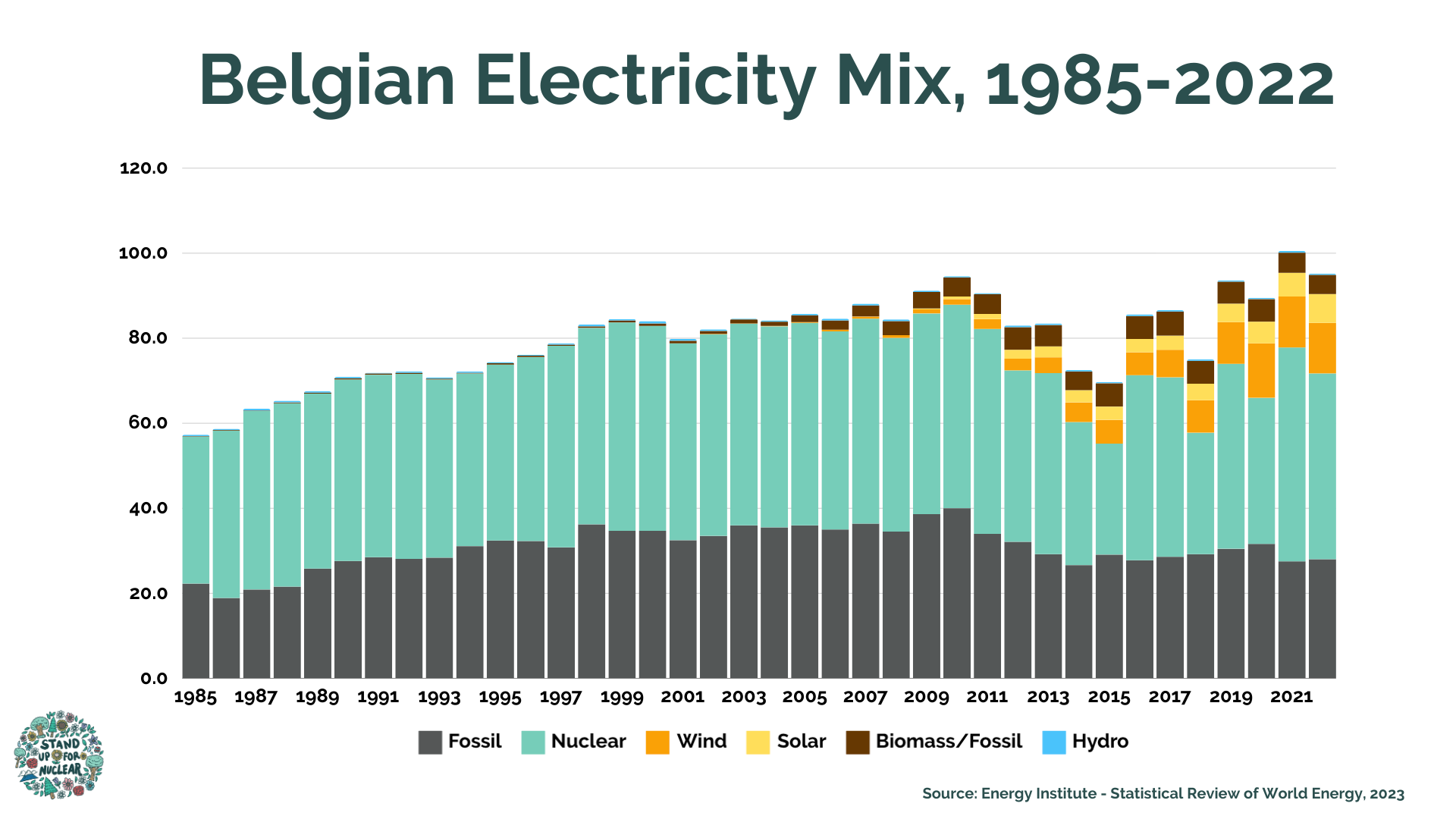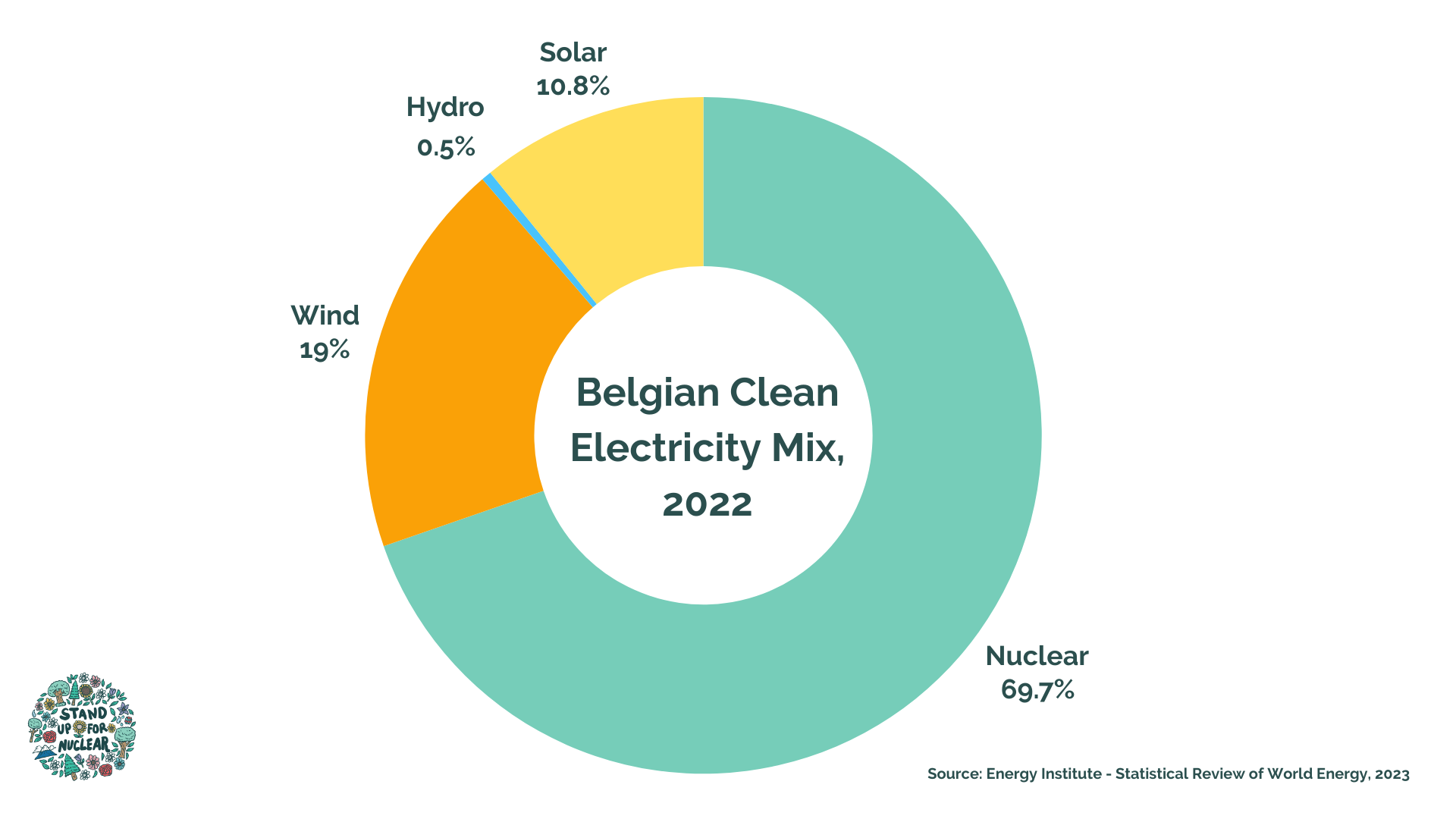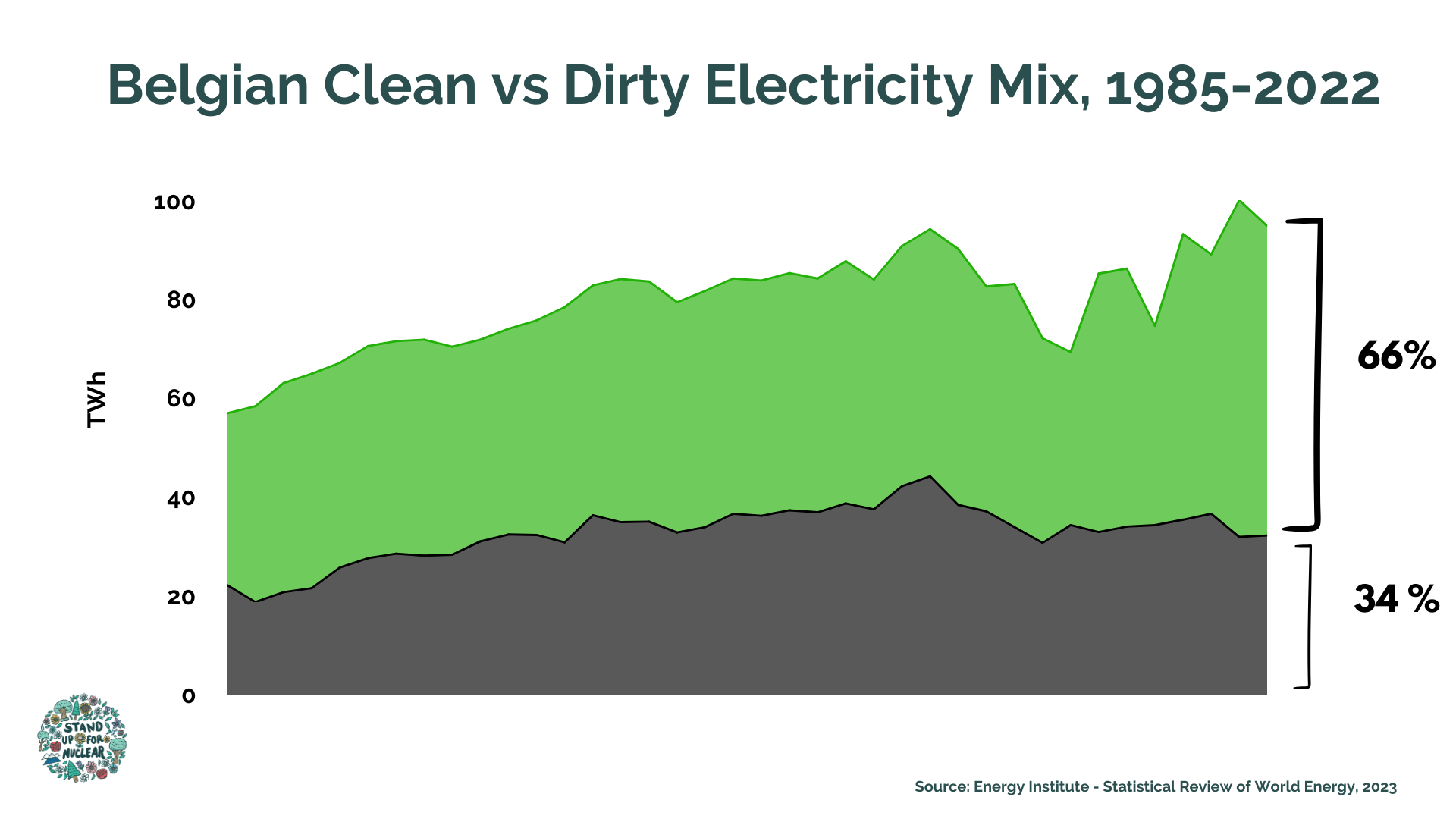Belgium
66% of Belgium’s electricity comes from clean sources - 34% is dirty
Belgium has two nuclear plants - Doel and Tihange = a total of 7 reactors (brought online between 1974-1985)
In 2003 the Nuclear Phaseout Act was passed
Since 2022, 3 reactors have been closed, and Belgium’s 4 remaining nuclear reactors supply 46% of their electricity
Nuclear is the backbone of Belgium’s clean energy infrastructure, generating 70% of the nation’s clean electricity
Together, the Doel and Tihange plants employ around 2,000 workers
Nuclear phase-out dates: 2022-2035
Tihange 1 - October 1, 2025
Doel 2 - December 1, 2025
Tihange 3 - September 1, 2035
Doel 4 - July 1, 2035
Recent nuclear extensions:
In December 2023, the Belgian government extended Tihange 3 and Doel 4 by 10 years
In January 2025, the newly formed coalition government announced in their preliminary report the desire to explore the feasibility of a 20-year extension instead of 10.



why are they shutting down their nuclear plants & how did we get here?
Belgium’s Nuclear Research Knowledge Center (SCK-CEN) - 1964
In the 1950s with rich uranium deposits found in the Belgian Congo mines, combined with a desire for energy security, the Belgian government starts its pursuit of nuclear technology for research and commercial energy production. In 1952 the Nuclear Research Knowledge Center was established and by 1974 Belgium’s first commercial nuclear reactor enters into operation.
At the same, anti-nuclear green political opposition began to form. Ecolo (National French-speaking Green Party) and Groen (Flemish Green Political Party) would become the largest green parties. In 1999 as part of the Verhofstadt I coalition government, Groen/Ecolo ruled alongside the socialists from 1999-2003.
The two parties were born from civil society groups calling for a new model of society and economic development that they perceived to be more sustainable and respectful of the environment. They had anti-growth, anti-materialist, anti-consumption, and anti-weapons beliefs at their core. It was their fear of weapons and hatred of material progress that led to their opposition to nuclear energy.
During their time in office, while holding key roles in the administration, they pushed their green agenda, focusing on renewables, efficiency, public transit, and opposing nuclear energy - their involvement led to the phaseout act of 2003 that prohibited the building of new nuclear power plants and limited the operating lifetimes of existing ones to 40 years, forcing all reactors to close by 2025.
In 2011 with the Fukushima Daichii accident, anti-nuclear sentiment was revived, and the country confirmed its support for the nuclear phase-out policy, planning for the closure of Tihange 1 in 2015. However, in 2012, facing energy reliability problems, the Belgian government extended the Tihange 1 reactor by 10 years.
In 2020, Tinne Van der Straeten, a Groen politician and former lawyer for the gas industry, was appointed Minister of Energy in De Croo’s coalition government. Van Der Straeten and her party are dedicated to the nuclear phaseout and prioritize this as their most important issue.
Tinne Van Der Straeten and Former Prime Minister De Croo (Brussels Times)
But in 2023, Elia, the Belgian Electricity System Operator warned leaders of an energy shortage in the winter of 2025 and 2026 if a deal was not reached to extend Doel 4 and Tihange 3. Many parties afraid of energy reliability, maintained the option for a nuclear extension, pushing for the so-called “Plan B”.
The delicate, political dance between Electrabel/ENGIE, De Croo, and Van der Straeten concluded in June of 2023 with a deal to extend Tihange 3 and Doel 4 but continue the shutdown of the remaining 5 reactors by 2025.
effects of the doel 3 & tihange 2 reactor closures
In 2022, the IEA warned Belgium that the phaseout would significantly impact the Belgian electricity system, leading to “higher greenhouse gas emissions and potential challenges to maintaining security of electricity supply.”
After Doel 3 closed in September 2022 and Tihange 2 closed in January 2023, losing of 2GWs of clean power, Belgium saw CO2 emissions from electricity rise by 13%. Based on conservative estimates, emissions rose from 146 to 168 grams of CO2 per kilowatt hour (KWh), compared to the same period in 2022.
With nuclear plants closing, Belgium struggles to free itself from fossil fuel reliance, the country may see fossil fuel demand rise through 2030 and make little progress on greenhouse gas emissions.
What’s the current status?
In December 2024, the FANC, the nuclear regulator, made a public statement leaving the door open for restarts and extensions, stating, "In theory, anything is possible, but the efforts that would have to be done for that are very large." It also emphasized that a clear and stable course is needed as soon as possible, especially if the next government wants to extend the life of more Belgian nuclear reactors than the two that have already been decided.
In March 2025, the 10-year extension of the Doel-4 and Tihange-3 nuclear power plants in Belgium was formalized between French energy group Engie and the Belgian state.
In April 2025, the new coalition submitted its new bill that would be the first step in abolishing the 2003 law to major parties and will be voted on April 22, 2025. The Minister of Energy, Mathieu Bihet, said this "paves the way for a regulated framework that ensures the safety of both existing and future plants.
Advocates are now waiting to read the FANC’s latest report on the feasibility of more extensions in their latest report released on April 1st, 2025. The report affirms safety standards and regulations within the Belgian nuclear fleet.
On May 15, 2025, the Belgian legislature repealed its 2003 law banning construction of new nuclear reactors, by a vote of 102 to 8.
FANC’s benchmark report on nuclear safety requirements looks at the feasibility of reactor extensions and leaves the door open for the utility ENGIE to make moves to extend lifetims of Belgium’s reactors.
what can be done?
Although Doel 1, Doel 3, and Tihange 2 have been turned off, it is not too late. Depending on the status of the deconstruction work, reactors can still be restarted for a modest cost, especially in comparison to new reactor construction.
If the shutdown of the two reactors without extensions, Doel 2 and Tihange 1, is to be stopped, the new coalition government elected this past June of 2024 needs to give ENGIE/Electrabel and the FANC the green light to prepare for life extension.
However, for the long-term protection of Belgian nuclear energy, the nuclear phaseout law of 2003 must be repealed, and the Belgian public must demonstrate their support for the continued use of nuclear energy to their elected officials.
what can I do to help?
history of Belgian nuclear & politics
our efforts
Since 2019, we have worked alongside our Belgian advocates in raising awareness, mobilizing members, and organizing events. In the last 5 years, our efforts provided the space for members of the public, journalists, and politicians to change their minds and voice support for nuclear energy.
Our first demonstration was held in April 2019, in partnership with the 100 TWh organization in the heart of Brussels. Although we received little media attention, the event laid the foundation for future advocacy. Five months later in September 2019, the Belgians organized their second Stand Up for Nuclear event, receiving media coverage in 10 news outlets.
2020: Employees at the Doel nuclear power plant protest: "Closing nuclear power plants endangers 7,000 jobs"
In December 2020, several hundreds of nuclear workers from Doel and Tihange protested at the site of the Doel Nuclear Plant in an attempt to prevent its shutdown. Unions representing the workers highlighted the 7,000 clean energy jobs at risk.
In September 2021, we went back and rallied at the same spot. Allies from 12 countries joined us and had 50 Belgian nuclear workers in attendance. The Brussels pro-nuclear international event had 250 attendees and was covered by 7 media outlets. Not only was Belgium’s nuclear under siege, but nuclear energy across Europe. Newly elected Energy PM Tinne Van der Straaten confirmed she would push for all reactors to close by 2025.
2021: 500 Belgian workers
In November 2021, 300 Belgian union workers marched in support of saving their nuclear plants. As they marched to the Federal Ministry of Energy Office, workers held signs reading “Proud to produce 50% of Belgian electricity” and “Nuclear is not an obstacle to renewable energies.”
In solidarity, ENGIE executives attended the November march with workers to voice opposition to the closures. “If we close all the power plants, we are heading towards a social, energy, and environmental disaster,” said Arnaud Poulain, representing executives.
In 2022, Stand Up Allies witnessed the closure of Doel 3. Over 100 individuals and 12 journalists traveled to the small town of Doel to attend the demonstration. With Doel in the backdrop, advocates held a press conference, asking “Why shut down nuclear power in a worsening energy & climate crisis?" This event received the most press coverage of any pro-nuclear demonstration in Belgium.
Paul Bossens, Director of
In January 2023, on the day of Tihange 2’s closure, 12 ally organizations from across Europe, joined us in commemorating the loss on the riverbank across from the plant. Along the water, we displayed 1,000 white flags representing the loss of 1,000 MWs of clean energy. This was the first event where prominent political leaders were in attendance voicing support.
On March 20, 2024, we held a demonstration in support of the IAEA Nuclear Energy Summit in Brussels. Advocates from 11 countries aimed to show the growing support for nuclear energy.
Our demands for our Doel 2025 Demonstration
With our allies, we will host a demonstration at the Doel Nuclear Plant to protest its reactor closure on February 15th, 2025. The recently formed pro-nuclear coalition government has announced ambitious plans to extend reactors, repeal the phaseout law, and build new reactors. However, the coalition has yet to take action on stopping the closure of the three reactors slated for closure this year - Doel 1, Doel 2, and Tihange 2.













